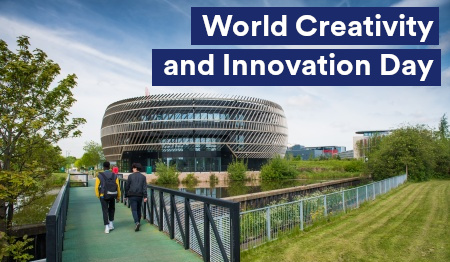
April 21, 2022, by aczjb1
Entrepreneurial Creativity – MSc Blogs
Today is World Creativity and Innovation Day!
To celebrate, we’re showcasing some work from the university’s home of innovation and entrepreneurship, the Haydn Green Institute (HGI) at Nottingham University Business School.
One of the most popular modules on HGI’s MSc Entrepreneurship, Innovation and Management is Entrepreneurial Creativity, run by Dr Christopher Carter. The module is designed for budding entrepreneurs to explore the business planning process while learning how to use different theories and creative techniques to solve problems and generate innovative ideas.
We asked some of this year’s cohort to share their thoughts on what they learned about their own entrepreneurial creativity on the course.
—
Jack Greenwood

Jack Greenwood
Entrepreneurial Creativity has transformed my understanding of creativity and its integral role in business innovation. Before the module, I didn’t think that I was creative; I was weighed down by false suppositions that creativity was only possessed by those in creative Arts or Humanities. In fact, through the lectures and suggested reading, I have realised that you can be creative in any field. While certain individuals may naturally be more creative, creativity is a skill that can be developed and improved upon through practice and experience.
During the first few weeks, I became grounded in the fundamental concepts of entrepreneurial creativity, the role of entrepreneurship in society, and of an entrepreneur as an “agent of change”. I was introduced to the key concepts of creativity, including the mechanisms, stages, and creative problem-solving processes. From this, I developed an appreciation for its imperativeness in innovation. Through my first blog post, I delved deeper into how creativity can be enhanced in business. When writing this, I was particularly taken by work by Elsbach & Hargadon, (2006), which explained the link between overworking, stress, and reduced creativity. I found their suggestion of balancing cognitively challenging work periods with more mindless work to protect creativity and maintain productivity particularly insightful for my university studies.
In addition to enriching my understanding of the role and importance of creativity in entrepreneurship, I have also developed personally on the module. For example, through the seminar sessions, I have improved my ability to articulate and express my ideas in small and larger groups, and I also had the opportunity to work in diverse teams with students from all backgrounds and cultures, which was eye-opening and enriching. During the sessions, we improved our teamwork skills by learning how we can use understanding our individual psychologies as a tool to form highly effective groups and optimise creative output.
In conclusion, entrepreneurial creativity has been more than just another module. The module has been particularly enriching because alongside developing my own creativity, I have grown as a person, improving my confidence and team working skills along the way. These are skills that I can take forward to prepare me to succeed in my future career.
—
Xintong Wang

Xintong Wang
During my time studying Entrepreneurial Creativity, I have engaged in profound self-reflection while gaining new knowledge through the constant collision of different cultures. I recognised my shortcomings and found that acknowledging them was not scary but helpful me to develop my future career, and began to understand more about the concepts of entrepreneurship, innovation and creativity.
My initial reflection began with an interview with Wendy Furness, an Entrepreneur in Residence at Nottingham University Business School. When she shared her experience of starting her own business, she stressed the importance of being honest about your strengths and weaknesses, especially your shortcomings, so that you can look for partners who can compensate for these shortcomings. Based on her advice, I reflected on myself deeply: I am not good at taking on vast amounts of pressure, especially the pressure to take responsibility for big decisions, which makes me anxious and then slack off; however, when I am less stressed, I feel energised towards a goal, actively and rationally planning and completing it.
This shows that I am good at execution and organisation. Soon, my reflections proved to be correct. When I was in the Food Waste project group, I was willing to complete the tasks she assigned me under the leadership of the team leader, and I was more productive because the leader reduced my stress level. In the end, our group came up with the ‘Fridge Friends’ project, which is a digital entrepreneurship project, and we are very optimistic about the project’s future.
Overall, I am grateful to my tutor for allowing me to reflect and learn in a lively and very creative classroom. I am grateful to my group members, we accommodated and understood each other and helped me to feel the warmth and team spirit in a foreign country. I will benefit from this experience for the rest of my life.
Discover more about Postgraduate study at the Haydn Green Institute here.
No comments yet, fill out a comment to be the first

Leave a Reply